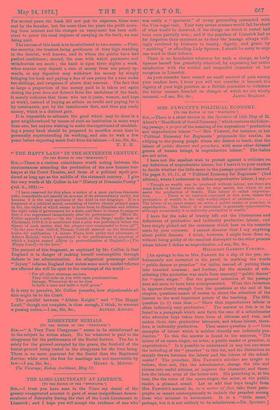4C THE HAPPY LAND" IN THE SIXTEENTH CENTURY.
[TO THE EDITOR OF THE "SPECTATOR."]
Zut,—There is a curious coincidence worth noting between the -circumstances attending the production of the now famous bur- lesque at the Court Theatre, and those of a political squib pro- -duced as long ago as the middle of the sixteenth century. I give the very words of Mr. Collier in his" History of Dramatic Poetry" (vol. ii., 369) :—
"I have reserved for this place a notice of a most curious dramatic relic, remarkable not merely on account of its extraordinary rarity, but because it is the only specimen of the kind in our language. It is a fragment of a political moral, consisting of twelve closely printed pages itt 4to, the object of which seems to have been to illustrate and enforce the right rules of government for a state, and there is reason to suppose that it was suppressed immediately after its performance." [Here Mr. Collier appends a note :—"In the 'Annals of the Stage,' under date of Christmas, 1558-9, it is mentioned that a play was performed before the 'Queen of such matter that the players were commanded to leave off."] -"In the year from 1565-6, Thomas Colwell entered on the Stationers' books for publication 'A merye Plays, both pythy and pleasaunt, of .Albyon Knights' which I apprehend is the performance in question, of -which a knight named Albion (a personification of England)—[The Happy Land]—is the hero."
The purport of this fragment, as explained by Mr. Collier, is that England is in danger of making herself contemptible through -defects in her administration. An allegorical personage called 4' Injury" informs England that unless some much needed reforms are effected she will lie open to the contempt of the world:— " For all other straunge nacions,
They will rails on you with open proclamacions, Saienge, Whosoever do as he dose Is hallo a man and halfe a wyld goose."
It is easy to perceive, Mr. Collier remarks, how objectionable all this might be to the Court.
The parallel between "Albion Knight" and "The Happy Land," though not complete, is close enough, I think, to warrant
41. passing notice.—I am, Sir, &c., ALFRED AINGER.


































 Previous page
Previous page